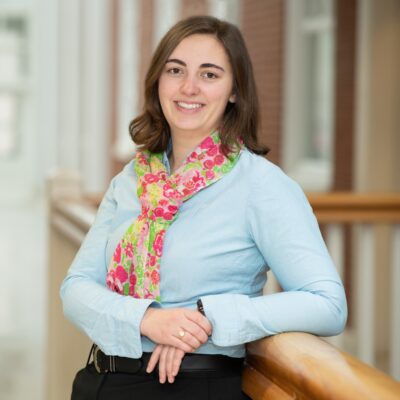Student Spotlight: Virginia McGhee

May 22, 2024
Virginia McGhee is a doctoral candidate in chemistry and chemical biology from Charleston, West Virginia. She earned her B.S. in chemistry with a minor in molecular and cell biology from Washington and Lee University and now studies how solar cell materials function on an electronic level under the guidance of John Marohn at Cornell.
What is your area of research and why is it important?
Developing new solar technology is imperative for transitioning to renewable energy sources. My research explores how solar cell materials function on an electronic level. With a custom-built microscope that probes how electricity flows through various solar cell materials, we extract information on light harvesting efficiency and sustainability. Deepening our understanding of how materials function is critical for improving materials design, solar cell longevity, and solar panel affordability, thereby making solar energy more accessible to the general public.
What are the larger implications of this research?
Solar energy plays a key role in creating a greener, more sustainable future. Sunlight is an endless energy source that can be harnessed by leveraging chemistry, but currently, this process is expensive. Energy runs the world and fossil fuel is a relatively cheap resource; however, its supply is limited and it is harmful to the environment. Understanding how materials function is key to advancing affordable commercialization of new solar panels. Electrical measurements mapping charge motion guide us to optimized recipes for the highest efficiency and lowest cost material. My work puts us one step closer to a carbon neutral society.
What does it mean to you to have been selected for the Department of Energy’s Office of Science Graduate Student Research program?
I am honored to be selected for the SCGSR program! I am excited to work with and learn from the world’s leading scientists in renewable energy research.
What will this selection allow you to do that you may not have been able to otherwise?
Working at the National Renewable Energy Labs (NREL) will provide me with access to specialized instruments not available at Cornell University. These measurements are imperative for validating my ongoing project which involves both novel experimental measurements and computational theory. Furthermore, I will learn synthesis techniques from the field’s leading experts and will bring back that knowledge to share with my colleagues in the Marohn Group. Much of my doctoral work has involved building a custom microscope, so in addition to learning from the researchers at NREL, I will assist in adjusting some of their instruments to enable our unique measurements.
President Pollack has designated this academic year’s theme as freedom of expression. What does freedom of expression mean to you?
With everything that has happened this year the idea of freedom of expression has become a bit complicated. I believe everyone has the right to voice their opinions and doing so encourages free thought, academic discussion, and an opportunity to learn from others’ experiences. However, when one’s opinions are hateful or expressed in a way that is more disruptive than beneficial, one is not immune to the consequences of said opinions.
What are your hobbies or interests outside of your research or scholarship?
As a graduate student, nothing is more important than finding a healthy work-life balance. I have found this through many Ithaca communities. My year-round hobby is taking classes at Circus Culture where I practice aerial silks and trapeze three to four days a week! In the winter I enjoy snow-skiing and being a part of the Lynah Faithful (I attended every home hockey game and several away games this year!). In the summer I try to spend as much time outside as I can. I am also an active member of the Episcopal church and member of their choir.
Why did you choose Cornell to pursue your degree?
I chose Cornell after attending several visit weekends because it felt special in a way nowhere else did. All of the faculty value each other’s insights, which promotes highly collaborative projects. Chemistry is broken down into subfields, but at Cornell, these divisions are blurry. I met with my now advisor, Prof. John Marohn, because I was interested in his solar research. Because of the collaborative nature of the field and university, we work with several synthetic chemistry and materials science groups. I was inspired by the potential to work from several angles on the same project.
